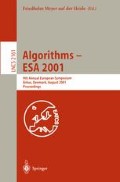Abstract
The minimum test collection problem is defined as follows. Given a ground set \( \mathcal{S} \) and a collection \( \mathcal{C} \) of tests (subsets of \( \mathcal{S} \)), find the minimum subcollection \( \mathcal{C}' \) of \( \mathcal{C} \) such that for every pair of elements (x, y) in \( \mathcal{S} \) there exists a test in \( \mathcal{C}' \) that contains exactly one of x and y. It is well known that the greedy algorithm gives a 1 + 2lnn approximation for the test collection problem where \( n = \left| \mathcal{S} \right| \), the size of the ground set. In this paper, we show that this algorithm is close to the best possible, namely that there is no o(logn)-approximation algorithm for the test collection problem unless P = NP.
We give approximation algorithms for this problem in the case when all the tests have a small cardinality, significantly improving the performance guarantee achievable by the greedy algorithm. In particular, for instances with test sizes at most k we derive an O(logk) approximation. We show APX-hardness of the version with test sizes at most two, and present an approximation algorithm with ratio \( \tfrac{7} {6} + \varepsilon \) for any fixed ε > 0.
Supported by a Merck Computational Biology and Chemistry Program Graduate Fellowship from the Merck Company Foundation.
Supported in part by subcontract No. 16082-RFP-00-2C in the area of “Combinatorial Optimization in Biology (XAXE),” Los Alamos National Laboratories.
Access this chapter
Tax calculation will be finalised at checkout
Purchases are for personal use only
Preview
Unable to display preview. Download preview PDF.
References
M. Abbink. The test cover problem. Master’s thesis, University of Amsterdam, 1995.
S. Arora and M. Sudan. Improved low degree testing and its applications. In Proceedings of the Twenty-Ninth Annual ACM Symposium on Theory of Computing, pages 485–495, El Paso, Texas, 4–6 May 1997.
K.M. J. De Bontridder. Methods for solving the test cover problem. Master’s thesis, Eindhoven University of Technology, 1997.
U. Feige. A threshold of ln n for approximating set cover. Journal of the ACM, 45:634–652, 1998.
U. Feige and J. Killian. Zero knowledge and the chromatic number. J. Comput. System Sci., 57:187–199, 1998.
M.R. Garey and D.S. Johnson. Computers and Intractability: A Guide to the Theory of NP-completeness. W.H. Freeman and Company, 1979.
B.V. Halld’orsson, J.S. Minden, and R. Ravi. PIER: Protein identification by epitope recognition. In N. El-Mabrouk, T. Lengauer, and D. Sankoff, editors, Currents in Computational Molecular Biology 2001, pages 109–110, 2001.
M.M. Halldórsson. A still better performance guarentee for approximate graph coloring. Information Processing Letters, 45:19–23, 1993.
D. S. Hochbaum Approximation Algorithms for NP-hard problems. PWS, 1997.
C.A.J. Hurkens and A. Schrijver. On the size of systems of sets every t of which have an SDR, with an application to the worst-case ratio of heuristics for packing problems. SIAM J. Discrete Mathematics, 2:68–72, 1989.
D.S. Johnson. Approximation algorithms for combinatorial problems. J. Comput. System Sci, 9:256–278, 1972.
V. Kann Maximum bounded 3-dimensional matching is MAX SNP-complete. Information Processing Letters, 37:27–35, 1991.
R. Loulou. Minimal cut cover of a graph with an application to the testing of electronic boards. Operations Research Letters, 12:301–305, 1992.
L. Lovász. On the ratio of optimal integral and fractional covers. Discrete Mathematics, 13:383–390, 1975.
C. Lund and M. Yannakakis. On the hardness of approximating minimization problems. Journal of the ACM, 41(5):960–981, 1994.
B.M.E. Moret and H.D. Shapiro. On minimizing a set of tests. SIAM Journal on Scientific and Statistical Computing, 6:983–1003, 1985.
R. Motwani and J. Naor. On exact and approximate cut covers of graphs. Technical report, Stanford University, 1994.
Author information
Authors and Affiliations
Editor information
Editors and Affiliations
Rights and permissions
Copyright information
© 2001 Springer-Verlag Berlin Heidelberg
About this paper
Cite this paper
Halldórsson, B.V., Halldórsson, M.M., Ravi, R. (2001). On the Approximability of the Minimum Test Collection Problem. In: auf der Heide, F.M. (eds) Algorithms — ESA 2001. ESA 2001. Lecture Notes in Computer Science, vol 2161. Springer, Berlin, Heidelberg. https://doi.org/10.1007/3-540-44676-1_13
Download citation
DOI: https://doi.org/10.1007/3-540-44676-1_13
Published:
Publisher Name: Springer, Berlin, Heidelberg
Print ISBN: 978-3-540-42493-2
Online ISBN: 978-3-540-44676-7
eBook Packages: Springer Book Archive

